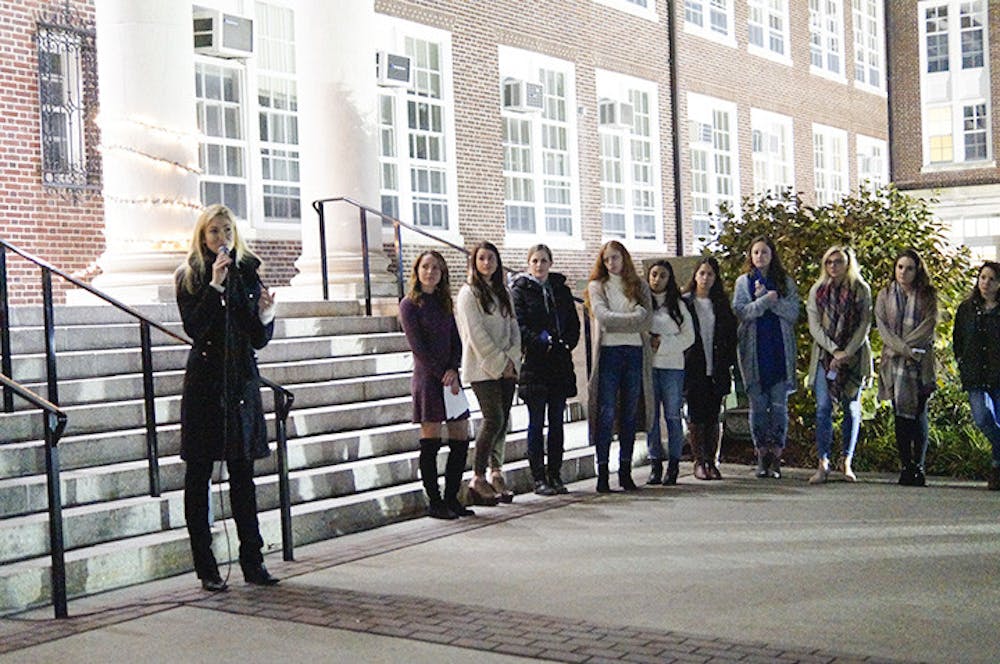By Breeda Bennett-Jones
News Assistant
As the fire passed from candle to candle, the silent, dimly lit steps of Green Hall transformed into a panorama of flickering lights and hugging sorority sisters. Though biting winds threatened to extinguish the flames, members of Delta Phi Epsilon were warmed by uplifting speeches and the light of the candles they grasped.
Delta Phi Epsilon’s annual ANAD Week, sponsored by the National Association of Anorexia Nervosa and Associated Disorders, culminated on Wednesday, Nov. 8, with an outdoor candlelit vigil honoring the sufferers and victims of eating disorders.
The vigil was accompanied with a speech by Kirsten Haglund, Miss America 2008 and the founder of the Kirsten Haglund Foundation. As a former Miss America, she chose to focus her work on helping Americans who suffer from eating disorders.
The evening began when Jess Meline, a senior psychology major, who read the ANAD pledge.

“I will accept myself as I am,” Meline recited. “My future is worth fighting for.”
Haglund then echoed the same sentiment.
“It frustrates me that sometimes there’s a barrier put up by the toxic entertainment industry,” Haglund said.
Haglund shared her powerful story, including her experience with anorexia nervosa. It began with intense ballet training, self-induced pressure and family complications.
When Haglund was 12 years old, her mother was diagnosed with breast cancer and her younger brother developed symptoms of Obsessive Compulsive Disorder.
“It was a perfect storm of factors,” Haglund said.
Haglund also feared that she wouldn’t be able to achieve her lifelong goal of becoming a professional ballet dancer.
As she compared herself to other dancers who used starvation tactics to stay lean, she began to emulate their behavior. By the time she was 17 years old, she was six months into an outpatient treatment program.
“It’s a disease,” Haglund said. “You can’t just dip one toe in. It’s like quicksand. It devours you.”
Haglund began the uphill battle of recovery, a process she described as one step forward, two steps backward.
She identified the roots of her body image problems, which included people-pleasing and being self-critical, and slowly began to gain weight again. Her previous goal of wanting to be a perfect dancer was overcome by a new goal of wanting to feel confident again.

Haglund found her voice by deciding to compete in the Miss America pageant. Though she originally competed as a way to earn scholarship money for college, she moved quickly through the county and state levels.
About three years after entering treatment in 2008, Haglund was crowned Miss America in front of an audience of millions.
“It gave me an incredible way to solidify my recovery,” Haglund said.
Nearly 10 years later, Haglund runs the Kirsten Haglund Foundation and has helped fund treatment for almost 200 girls who suffer from similar eating disorders. She also works as an ambassador for Timberline Knolls, a female residential treatment center based in Illinois.
“She’s a great advocate for body acceptance and body positivity,” said Sally Sebastian, a professional outreach representative for the east region. “She just has this joyful personality that’s contagious to everyone around her.”
In addition to her work with residential facilities, Haglund continues to speak on college campuses nationwide in an effort to spread awareness about eating disorders and inspire students to be observant, speak up and get help.
“The more conversation there is about it, the easier people will find it to seek help,” Haglund told The Signal. “All change starts with you.”
Summer Herlihy, a junior psychology major and ANAD chair for Delta Phi Epsilon, spoke about the sorority’s dedication to body positivity.
“It’s our main priority,” Herlihy said. “We’re just trying to make people feel how a person with an eating disorder would feel.”
After Haglund’s speech, sisters, friends and students gathered in a circle, clutching candles. When the last candle was lit, Meline called for a moment of silence.
Thoughts of homework and the bitter cold faded. For a moment, in the circle of remembrance, all was still.







